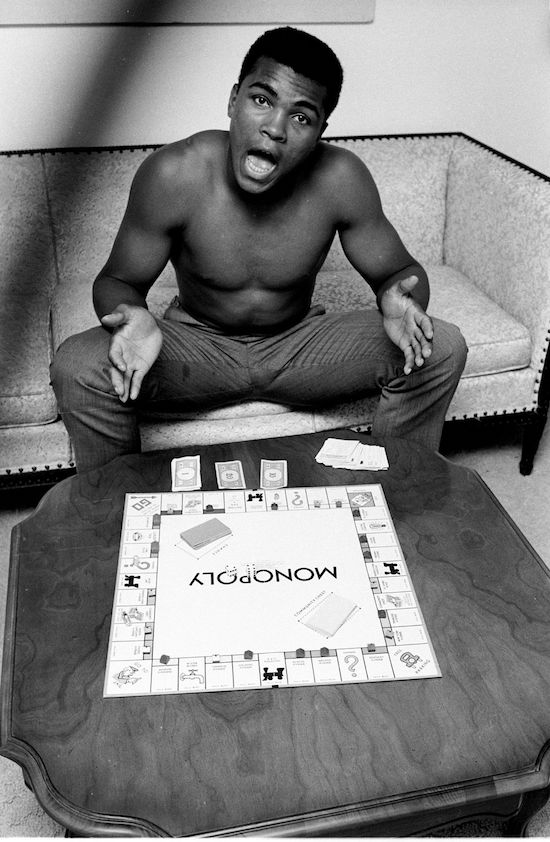
Steve Schapiro Muhammad Ali, Monopoly, Louisville, KY 1963
It’s funny how things go sometimes, how times roll -not just the good ones-. I said last week that all the world’s “leaders” had failed terribly, and I’m not taking that back. They all failed to a horrific extent at their no. 1 task when it comes to Disasters, Pandemics, whatever their respective governments file these events under: Prevention. But now we’re in a whole new world.
Now these failed leaders move into a situation they actually MAY be able to handle. That is, the -crisis- management that inevitably follows AFTER the failure at their no. 1 task of Prevention. They MAY be able to pull this off because it’s what they were trained to do: be little managers. You know them, because every company these days is full of them, and some will make it to biggest little manager status, through blind ambition and/or licking up to previous little managers. Some may even become government ministers. Core characteristic: these people don’t act, they re-act. Prevention is a job they’re absolutely not qualified for
Trump, Macron, BoJo, Merkel, Rutte, Xi, Abe, Conte, you name them, they’re all little managers, they’re not leaders, they have no ideas or visions, at least not original ones. People with original ideas don’t become politicians, not in the climate we have created since the 1950’s. The 20th century was poor anyway when it comes to vision, it was all about money, and no great vision has ever been derived from that.
The last century had Gandhi and Martin Luther King -and I would personally add Muhammad Ali-, and that combination says a lot about what we could have become vs what we have. In a way, the world chose money over itself. The 20th century was when Faust won, when humanity sold its soul. That it also sold its home, its planet, seems almost irrelevant compared to that.
We could have chosen peace, health, we had people willing to give their lives so we would understand why, but we thought: nah, let’s go to war, there’s got to be more profit in that.
But okay, so they all failed at Prevention and now they get to shine, as long as that lasts. It’s now a matter of preventing -too- widespread poverty and hunger, of “selling” a certain number of deaths as unpreventable, and mostly of making stressed out people feel more comfortable. But there are still pitfalls along the way, and they won’t all make it past them in one piece.
The ones who presently pose as leaders even see their popularity ratings rise as they start “little managing” their territory. Because they failed in their no. 1 task, there are huge shortages of medical equipment etc., but they are -helped by their media- perceived as credible when they claim this was unforeseeable, since after all, all their neighboring little managers also failed at Prevention.
In actual reality, on January 1, the day after China told the WHO there was a problem in Wuhan, all the little managers should have been checking, with all the even littler managers working for them in the Disaster and/or Medical fields, whether all of the prevention apparatus in their countries was up to snuff, the protocols, the staff, the hospitals that might be needed, the production facilities, it’s a long list. Instead they all chose to ignore the WHO warning, and preoccupied themselves with their economies instead.
Just the fact that they waited for the WHO to say something says enough: it’s the perfect organization for all their excuses: hey, they didn’t warn us soon enough! And the little managers would be partly right: the WHO functions no more or better than they themselves do. Not when it comes to Prevention.
Still, at the $58 million or so we pay them a year, the WHO has no business waiting for a country that harbors an epidemic, to tell them it does. Because 99 out of 100 times, such a country will first try to hide the epidemic. Its leaders, too, are little managers who focus on their economies. The WHO’s job is to be there before it happens. And so you’re right, they fail exactly where the little political managers also fail: Prevention. There’s no doubt that there are brilliant people working there, but they’re all still managed by little managers.
Can we blame our own respective political little managers? To an extent, sure. They didn’t do what they promised to when they swore their respective oaths. But maybe just maybe we should blame ourselves more, for picking little managers to lead our countries in the first place. We could have known that they were never going to be more than 2nd rate “leaders” who were never going to deliver more than 2nd rate societies.
These people have no vision of a better world, all they are capable of is “managing” the world they find in ways that make them more popular, and the only way to do that is to make people -feel- rich. They do that by encouraging behavior that destroys the planet, they do it by exporting 90% of medicine production to China, they simply sell everything that’s not bolted down just so you will like them sometime in the next four years, and screw the next forty. Hey, they’re not complicated creatures.
In the process, though, far too many lives have been lost. And we should do something about that, something to make sure it doesn’t happen again. But that means we need to change the entire process that today self-selects exclusively for little managers. Don’t forget: a world made up of little managers will only ever select one of their own to succeed them. So get them out of the selection process.
And you might say an actual leader should have the chops to make everybody like him/her enough, but that begs the question: what were the odds of Martin Luther King being elected president of the US in the 1960’s? No, the system has really been due for a major change for a while.
For now, the only thing to do is hope the little managers are better at step 2, Crisis Management, than they were at step 1, Prevention. Because there are no ready alternatives. When they say stay home, that’s the best thing to do right now. It’ll be challenged soon enough. ‘Letting nature do its thing’ is not a great idea, because it would overwhelm our societies in no time, in all of its facets, and bring back the Middle Ages. We’re better off breaking it down step by step than all in one go.
The US making it to no. 1 in cases and soon deaths, and COVID19 soon making it to no. 1 on the list of causes of death in the US, is bad enough. All those press conferences where none of the little managers wear face masks while their usefulness is obvious, are a shameful exhibition of incompetence. Trump should be the first, tomorrow. Be the bleeding example. Teach people how to make them. Nassim Taleb says it’s about Asymmetry: “Error FROM NOT wearing masks is vastly costlier than the error FROM wearing masks.”
Let’s hope the little managers don’t all fail at securing food supplies as well, because it looks like those may be badly needed soon. Right now in the US, the narrative is Monsanto to the rescue of all the farmers who have trouble with Stay At Home and other measures, who can’t get farmhands. Yeah, let’s poison ourselves to survive. Brilliant.
And the little managers will say: look, we gave all of you unlimited amounts of money, and it hurt!, so you can’t blame us. Because that’s how they think, they think in money only, and therefore there is nothing that it cannot solve.

It must be possible to run the Automatic Earth on people’s kind donations. Ads no longer pay for all you read, your donations have become an integral part of the experience. It has become a two-way street; and isn’t that liberating, when you think about it? At the top of this page, you can choose between Paypal and Patreon.
Thanks everyone for your wonderful and generous donations lately. So very much obliged.

Support us in virustime. Help the Automatic Earth survive. It’s good for you.








